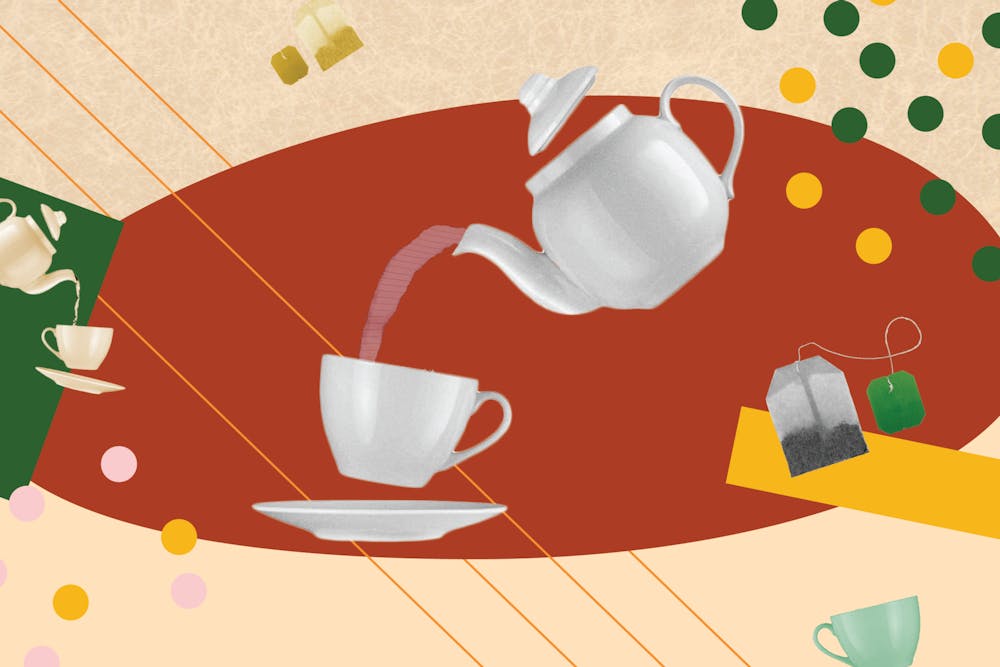I'm a coffee addict through and through. Every morning, I make my way to the kitchen, where I prepare a latte with fresh grounds, mix up some cold brew using my carafe and my favorite oat milk creamer, or, rarely, pour a plain old cup of hot coffee from the pot.
But after feeling aesthetic envy towards my avid tea–drinker friends, I wanted to see what the craze was all about. I quickly learned that there are many types of teas, and drinking different kinds can actually be beneficial for your health—unlike pounding back cup after cup of coffee.
To see whether tea is truly the superior beverage, I picked five popular teas to try—and documented my thoughts along the way. I rated them based on my experience drinking the teas and the health benefits they offer. The rating scale ranges from zero to five, with a zero being an awful experience and no additional health benefits, and a five being an incredible experience with a multitude of health benefits.
Bengal Spice
First impression: Good, but coffee is better. Drinking the tea, which I mixed with some warm oat milk, is a calming experience. The drink feels a little like Christmas, but it also tastes overwhelmingly spiced at times. Blended with hints of cinnamon, ginger, cardamom, and cloves, the tea is Celestial Seasonings' attempt at replicating chai, but decaffeinated. Because one of my favorite parts of chai is the caffeine, I’m going to stick to my iced chai lattes. Bengal Spice isn’t bad—it’s just too similar to caffeinated chai that I have no reason to sway from my go–to.
Or so I thought. Bengal Spice packs a bunch of health benefits into a tiny cup. The spices contain large amounts of antioxidants, which are important for developing a healthy immune system. According to Livestrong, the cloves found in Bengal Spice may also contain polyphenols, which can reduce inflammation and pain. So maybe there actually is reason to use Bengal Spice with my go–to chai latte—especially on days when I've already had a few too many cups of coffee.
Experience: 4/5
Health Benefits: 4/5
Sleepytime Tea
First impression: guilt for not trying this sooner. Another Celestial Seasonings creation, Sleepytime tea is advertised as a sleep aid. As if the illustration on the box isn’t relaxing enough, the hints of soothing herbs like spearmint and lemongrass alongside light touches of chamomile cradle you in an abyss of warmth. The flavor is subtle, but I think that’s the point.
The name of Sleepytime tea isn’t just a coincidence. The chamomile and delicate touches of lavender and other herbs are proven to soothe anxieties and induce better sleep. Though it’s not something I’d drink often, I’ll keep it around for stressful days when I decide to wind down by lying in bed with a candle and a TV sitcom.
Experience: 4/5
Health Benefits: 2/5
Chamomile
First impression: confusion. When I first take a sip of the hot chamomile tea, my initial thought is that maybe I made it incorrectly. It isn’t necessarily hard to drink; there just isn't a strong flavor. It's so subtle that I think I'm supposed to mix it with something. A quick Google search reveals chamomile is best when prepared with a splash of milk and some honey. After making another cup—this time with honey and some oat milk—my experience is immediately elevated. It feels like floating on a cloud—soothing as hell.
Similar to Sleepytime, but stripped down to the most important ingredient, chamomile tea is an interesting experience. Out of all the teas I've tried, chamomile comes with the most health benefits. It can help lower blood sugar, reduce inflammation, promote sleep and relaxation, and treat some cold symptoms.
Experience: 5/5
Health Benefits: 5/5
Mango Passionfruit Herbal Tea
First impression: This tea smells absolutely delicious. As I drink, I get hints of mango and passionfruit—like the name suggests—and the smell provides the perfect amount of flavor when sipping. I’ve never been a fan of unsweetened iced fruit teas, but after this, I think I want to try more of them served hot.
Black tea is high in antioxidants, and passion fruit also contains several minerals like magnesium, potassium, and calcium. Overall, this tea is the perfect go–to drink for these early spring months—the vibrant flavor can be enjoyed cold or hot depending on your preference.
Experience: 4/5
Health Benefits: 3/5
Raspberry and Hibiscus
First impression: admiration for this tea's beautiful color. However, I'm not a big fan of its taste. The flavor is pretty underwhelming compared to the deep purple color. When you see a tea with such a striking look, you expect it to pack the same punch in flavor. I'll give it credit for its freshness—I'm drinking it hot, but I can tell that if I put some ice and sweetener in it, it'd be the perfect summer drink.
The ingredient with the most health benefits is hibiscus, which gives the tea a "tart flavor similar to that of cranberries," according to Healthline.
Many studies have shown that drinking hibiscus tea can lower blood pressure, fight bacteria build–up, and even aid in weight loss. Some studies performed on rats found that it may even promote liver health.
Experience: 3/5
Health Benefits: 4/5
I've found that drinking tea is an acquired practice—but it has its benefits. As someone who loves coffee in so many forms, I'd never entertained the thought of drinking tea religiously before this experience. I probably won't become a daily tea drinker going forward, but I can confidently say that I've found teas that fill niches coffee cannot.







